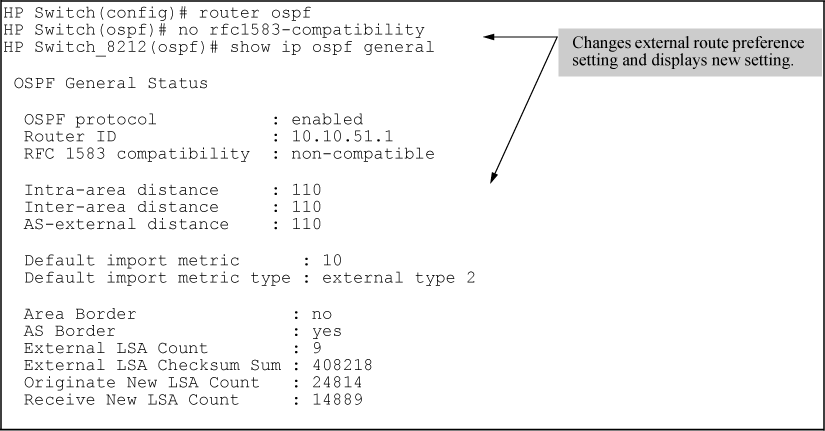OSPFv2 is the IPv4 implementation of the Open Shortest Path First protocol. (OSPFv3 is the IPv6 implementation of this protocol.) Beginning with software version K.15.01, the switches can be configured to run OSPFv2 either alone or simultaneously with OSPFv3. (OSPFv2 and OSPFv3 run as independent protocols on the switch and do not have any interaction when run simultaneously.)
For overview information on OSPF, see Overview of OSPF.
Syntax:
Executed at the global configuration level to enable IP routing on the routing switch.
The
noform of the command disables IP routing. (Global OSPF and RIP routing must be disabled before you disable IP routing.)
Example:
HP Switch(config)# ip routing
Syntax:
Executed at the global configuration level to enable OSPF on the routing switch and to enter the OSPF router context. This enables you to proceed with assigning OSPF areas, including area border router (ABR) and autonomous system boundary router (ASBR) configuration, and to modify OSPF global parameter settings as needed.
The
enableform of the command enables OSPF routing, and thedisableform of the command disables OSPF routing.Global IP routing must be enabled before executing this command.
The
noform of the command deletes all protocol specific information from the global context and interface context. All protocol parameters are set to default values.
NOTE: If you disable OSPF, the switch retains all the configuration information for the disabled protocol in flash memory. If you subsequently restart OSPF, the existing configuration will be applied. After restarting OSPF, the exiting configuration will be applied and the protocol will be in the disabled state.
Example
|
|
|
![[NOTE: ]](images/note.gif) |
NOTE: The |
|
|
To delete all protocol-specific information from the global context and interface context and set all protocol parameters to default values.:
HP Switch(config)#no router ospf HP Switch(ospf)#
For more information, see Changing the RFC 1583 OSPF compliance setting.
Syntax:
Executed at the global configuration level to toggle routing switch operation compliance between RFC 1583 and RFC 2328.
